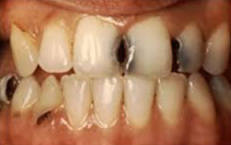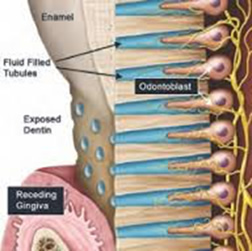
Question: There are so many options available to me when I look at the toothpaste selection at the store. Options ranging from organic, whitening, desensitizing, plaque and tartar reducing and other types are available. It overwhelms me when I try to make a decision on the best one to use. Can you give me some information that would be helpful when selecting them. Thank You.
Answer: You are correct when saying that there are many options available. It also blows me away when I look in the aisle. In my opinion it is important to choose a toothpaste that contains fluoride. I would like to discuss each major classification of toothpaste with some details so you can make informed decisions for you and your family.
Fluoride remineralizes teeth as the calcium is reduced in teeth. Calcium is leached out of the hard outer layer of the teeth (enamel) when the acid levels in the mouth increase. Acid is generated when eating sweets, pop, and other carbohydrates. When eating these food and drink the bacteria in the mouth metabolize the sugars as a food source. Acid is generated during this process which makes the teeth softer. Over time and frequency of exposure these can turn into cavities. I have young patients who have been addicted to sugars and constant sipping of pop. This process creates black or white spots on the teeth. The white spots are the beginning of cavities as this is the initial stages of decalcification. I use the analogy of when painted concrete starts to flake off of the side of a house. This is what happens when the white spots on the teeth turn into cavities. Cavities also form between the teeth and can appear as black areas. The constant exposure to sugar can create this. Seniors who have a very dry mouth are also at risk for these cavities because saliva will naturally neutralize the acid, and when it is not present cavities are inevitable. Fluoride in toothpaste helps to make the surface stronger and acid resistant. We will prescribe fluoride to be used in conjunction with fluoride containing toothpaste to aide in prevention of cavities. Seniors who are on many medications are at risk to get the cavities on the root surfaces of the teeth compared to the youth who sip on pop who get the cavities on the crown portion of the tooth.
Desensitizing toothpaste: This toothpaste contains compounds that block the movement of fluid in the dentinal tubules. The anatomy of teeth consists of 2/3 dentin and 1/3 enamel. The covering that we see in the mouth is the enamel portion. Enamel is about 95% mineral whereas the dentin is about 70% mineral. Pain is felt in the teeth though a system of small channels in the dentin called dentinal tubules. These are fluid filled with one end terminating in the nerve space of the tooth and the other end is exposed to the oral cavity. When hot, cold, sweets or pressure stimulus is applied to the dentin there is fluid movement in the tubule. This movement stimulates the nerve and pain is generated. Recession of the tooth exposes the root and dentin of the tooth making it vulnerable to this. Desensitizing toothpastes contain small particles that block these tubules thereby reducing the pain from these sensations.
 Whitening toothpastes: Enamel is made of a crystalline structure and over time there small cracks develop in the structure. Long chain molecules penetrate these micro cracks giving the tooth a darker appearance. Smoking, wine, and just age contribute to this phenomena. Bleaching agents contain oxidizing agents which break down these long chain molecules. Effective bleaching requires that the agent is strong enough and is in contact with the tooth long enough to break down the molecules. This is usually most effective with professional whitening via custom bleaching trays. The bleach is placed in the plastic tray and is worn for an hour or throughout the night. Whitening strips are also effective since they are in direct contact with the enamel. Whitening toothpastes just are not as effective because the concentration and contact time is inadequate to create a great result. Over time it can whiten but don’t expect quick results.
Whitening toothpastes: Enamel is made of a crystalline structure and over time there small cracks develop in the structure. Long chain molecules penetrate these micro cracks giving the tooth a darker appearance. Smoking, wine, and just age contribute to this phenomena. Bleaching agents contain oxidizing agents which break down these long chain molecules. Effective bleaching requires that the agent is strong enough and is in contact with the tooth long enough to break down the molecules. This is usually most effective with professional whitening via custom bleaching trays. The bleach is placed in the plastic tray and is worn for an hour or throughout the night. Whitening strips are also effective since they are in direct contact with the enamel. Whitening toothpastes just are not as effective because the concentration and contact time is inadequate to create a great result. Over time it can whiten but don’t expect quick results.
Tarter control toothpastes: These toothpastes are contain sodium pyrophosphate which helps to dissolve the tarter before it can stick to the teeth. These toothpastes will not remove tarter that has already formed and can contribute to canker sores. The only way to remove tarter is have it professionally since tarter is strongly bonded to the tooth.
I have found that Crest Pro Health rinses and toothpaste has created some problems for some of our patients. We have found that layers of tissue that lines the mouth seem to peal off if the patient does not rinse adequately with water. I usually advise that they discontinue its use and use a simple fluoridated tooth paste.
If your mouth is sensitive and prone to sores, using a simple toothpaste without all of these compounds is usually advisable. Biotene products are good for those who have dry mouths. It is formulated for sensitive mouths.
If you have any questions that you would like answered regarding anything in dentistry please contact us on our phone (586)247-3500, or write at 15055 22 Mile #2. Shelby Twp, MI 48315 or click here to reveal our email address.
Thank you,
Dr. Antolak
